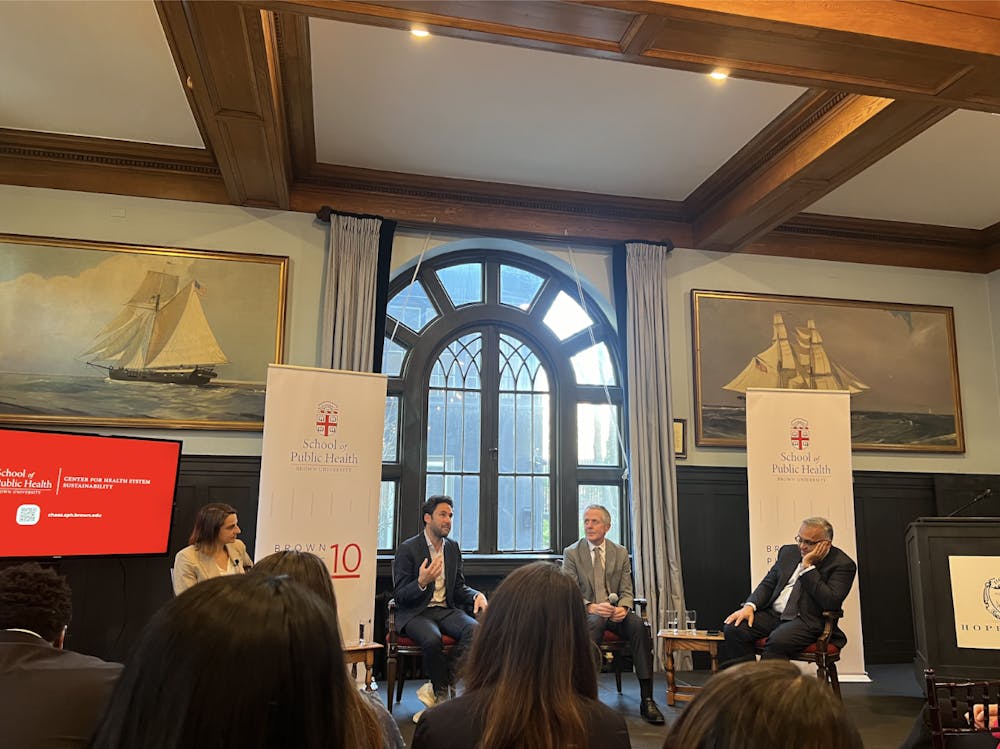The Center for Health System Sustainability at Brown’s School of Public Health celebrated its onset through an April 23 launch event at which speakers discussed how global and local communities can compare health systems to push advancements and solutions through the center’s work.
The event, titled “Lessons from Abroad: What can Rhode Island learn from other nations about health care costs, access and quality?”, began with an introduction from Martha Wofford, the CEO of Blue Cross & Blue Shield of Rhode Island, who overviewed the current affordability issues facing the state’s health system.
Wofford’s talk was followed by a panel discussion featuring CHeSS Director Irene Papanicolas, Jonathan Cylus from the World Health Organization and Luca Lorenzoni from the Organisation for Economic Co-operation and Development. SPH Dean Ashish K. Jha moderated the panel.
Speakers discussed public health in the context of the event’s three themes: cost, access and quality, with a comparative analysis focus.
During his introduction, Jha said that the event was a “long time coming,” and that it marks a highly anticipated launch for the School of Public Health.
The group at CHeSS and its collaborators “work together to use individual patient level data across countries to better understand how different health systems compare to one another,” Papanicolas said.
“The aim of CHeSS,” Visiting Assistant Professor of Health Services, Policy and Practice Ritesh Maharaj said in an interview with The Herald, “is to apply a consistent comparison lens using individual patient journeys to understand how countries can learn from each other to improve quality of care being provided.”
CHeSS is “trying to understand an individual patient’s pathway through the health system,” which can, in turn, allow researchers to “understand how decisions get made and therefore understand how countries can learn from each other,” he added.
As an example, Maharaj pointed to data on sepsis patients, who often have long-term recovery plans that can involve intensive care, rehabilitation and post-acute care. Studying patient-level data in different healthcare settings allows Maharaj to “understand how we can structure a health system that is responsive to the needs of patients, particularly in vulnerable populations,” he said.
In an interview with The Herald, Astrid Van Wilder, a postdoctoral research associate with CHeSS, said that through this individual approach, “we’re looking at the system as a whole,” focusing not only on hospitals, but also primary care and other types of health spaces.
That type of direct comparison differs from much of the existing literature on healthcare systems.
“Usually,” Van Wilder said, “we focus on one system and then maybe we’ll, at the end, in a discussion section, look at different systems.”
Maharaj is hopeful that this type of data will “demystify our understanding of how the health system actually operates in many countries.”
CHeSS researchers said they were optimistic that their research will be implemented effectively in public policy. Van Wilder explained that “we are involved with policymakers here, but also in other countries with people who have direct links to the research centers on their end.”
Papanicolas also emphasized CHeSS’s connections to international organizations, to which they can “help them think through how they collect, curate and analyze data to present to policymakers across the world” in combination with working “directly with policymakers when we give insights from other countries to think through national solutions.”
“I like to think of us as the architects,” said Sara Machado, a senior research associate at CHeSS, in that the center provides suggestions and data that can then be translated to tangible changes when recommendations are given to policymakers.

Francesca Grossberg is a staff writer covering Science and Research. She is a sophomore from New York City studying Health and Human Biology.





